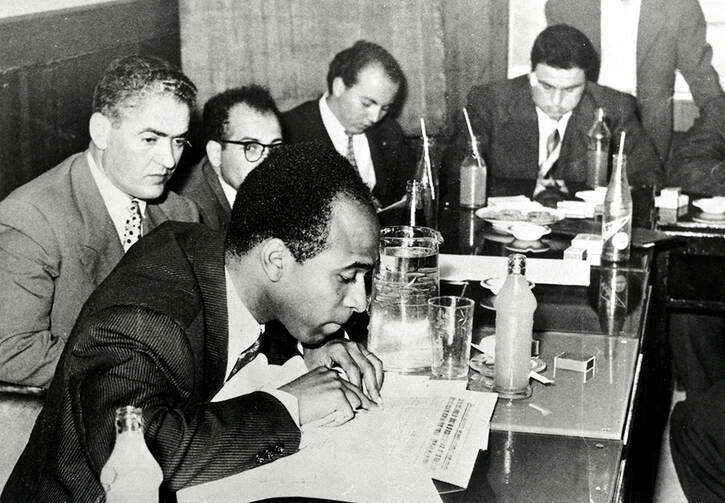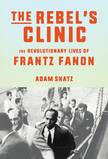Frantz Fanon is having a moment
Frantz Fanon is having a moment.
In the past year, in the aftermath of the Oct. 7, 2023, attacks in southern Israel, it has been impossible to talk about decolonization and Palestinian movements for independence, whether approvingly or disapprovingly, without referencing Fanon and his ideas. Even before last October, Fanon’s name was increasingly becoming a touchstone in discussions of policing and the Black Lives Matter movement—often a literal touchstone, a talisman in the author’s back pocket, a name that must be mentioned but that can be divorced from all context and analysis.
With his new biography, The Rebel’s Clinic: The Revolutionary Lives of Frantz Fanon, Adam Shatz seeks to feed Fanon’s moment and ground it in that missing context—Fanon the person, and not just his most famous soundbites.
Shatz brings us from Martinique, where Fanon grew up in a middle-class family believing he was as French as any Parisian; to France, where Fanon fought in the Second World War, became aware that he was Black, and went to medical school; to Algeria, where Fanon ran a psychiatric hospital, provided medical treatment to both the tortured and the torturers, became radicalized against the French colonial project, and was eventually expelled for his activities assisting the National Liberation Front in Algeria (F.L.N.); and finally to Tunis, where Fanon spent the rest of his short life as a spokesperson for the F.L.N.’s Algerian government in exile.
At times, The Rebel’s Clinic reads like a “Who’s Who” of 20th-century thought, with cameos by figures as varied as Jean-Paul Sartre, Richard Wright, André Mandouze, Eldridge Cleaver, Jacques Lacan, Aimé Césaire and Patrice Lumumba. Fanon’s story intertwines with French literary movements like Négritude and existentialism; early psychoanalysis and the earliest research on racism’s effects on health; the Black Panthers, the C.I.A., and the first diplomatic conferences among the newly independent African states; the Catholic Worker movement and the Communist Party; and, of course, decolonial movements throughout Africa, the Middle East and the world.
It is certainly an interesting and colorful life, and it is clear that Shatz likes and admires his subject as a person. But what drives the book are Fanon’s ideas, and what emerges is a portrait of a man whose thinking was much more nuanced and tortured on the questions of race, oppression and violence than he is typically given credit for.
Fanon’s most famous and controversial idea, and the one that Shatz’s book is most oriented at understanding, comes from the first line of his final and most famous book, The Wretched of the Earth: “Decolonization is always a violent phenomenon.” Fanon was consumed by the question of how much violence the colonized could or should absorb before colonial violence provoked an equal and opposite reaction.
This is sometimes caricatured by Fanon’s detractors as a focus on eye-for-eye justice or an obsession with a victim/oppressor paradigm, but that is unfair. Rather, Fanon was interested in excavating the inherent violence buried in colonization and asking whether it might be less violent and cause less harm to disrupt that status quo. He was asking about the limits of nonviolence—about the point at which repeatedly allowing oneself to be violated becomes less a form of radical love of one’s enemy and more an indication of self-hatred. What about when it becomes a question of passively watching the annihilation of other innocent people? Of one’s own children?
It can be hard to sit with such questions without feeling some degree of conflict. The question of when to choose violence is clearly weighty, but it is also a question that seems to have no correct answer. Within the church, both turning the other cheek and just war theory in defense of innocents have long-rooted histories. Shatz’s biography is, ultimately, a study in that ambivalence, which he argues Fanon shared.
In Shatz’s telling, Fanon’s ideas on violence were more descriptive than prescriptive. He did not believe violence to be inevitable or desirable and refused to see liberty as a zero-sum game—but colonialism had created a system in which violence was unavoidable and the French would lose if the Algerians gained liberty. In a situation in which someone must be subjugated, why must the Algerians consent to be the subjugated ones?
As a psychiatrist, Fanon understood both the temptation to revenge and the genuine psychological utility of the colonized choosing to fight back. Violence “rids the colonized of his inferiority complex, of his passive and despairing attitude,” allowing him to become a subject of history rather than a mere object—a man. (And the colonized person liberated by violence in Fanon’s imagination is a man.) But while Fanon saw anticolonial violence as “dis-intoxicating” at the individual level, he was not making a utilitarian argument about its effectiveness as a movement strategy and was quite clear-eyed about its complex effects at the national level.
Fanon acknowledged that the violence of decolonization, while unavoidable, would traumatize its participants, hobble national development, empower despotic leaders, entrench the “primitive Manichaeism of the colonizer” and lead to a more conservative and less equal society.
Shatz spends almost 400 pages untangling Fanon’s life and words to reach this summary of Fanon’s thoughts on violence. Others, doing the same, have reached very different conclusions. Fanon’s writings can be self-contradictory and unclear in a way that turns him into a political Rorschach test.
One question that plagues Fanon’s legacy is whether a person who can be used to support everyidea is useful in supporting any one idea. The lines of his thinking that one focuses on reveal more about that person than they do about him. Fanon can be used to support both sides of any number of questions: Should African states be built on Black nationalism or Enlightenment universalism? Are the structural economic effects of colonialism something that can and must be remedied, or are reparations wrong? Is decolonization primarily a material process or a psychological one? Is the use of violence against an oppressor empowering or crippling?
The answer to any of these, to hear Fanon tell it, is “yes.”
I was left with one final question at the end of The Rebel’s Clinic, to which I suspect Fanon’s answer would be different: Is spending all this time deducing what Fanon “really” thought worth it? Fanon’s “moment” is certainly earned, and perhaps no thinker’s ideas—about racial and national identity, about the appropriate responses to oppressive violence, about ends and means and consequences—are more worth engaging with this year than his. The questions that plagued Fanon haunt us today in only slightly modified form. The Algerian experience of decolonization, for example, was and is very important to Palestinian thought and self-conception, and understanding Fanon is a basic prerequisite for talking about the current war.
But my primary takeaway from The Rebel’s Clinic is that reading Shatz’s biographyis not a particularly effective shortcut. Instead, Shatz convinced me that I ought to sit down and re-read Fanon’s major works for myself—asking not what Fanon thinks, but: What do I think?











